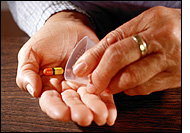Managing heart failure means getting good care, taking medication and watching your diet. Taking an active role in your care and following your doctor's orders will help to reduce your symptoms. It will also help by cutting down the number of visits to the hospital or emergency room.
 Your doctor may ask you to take medication to help your heart pump better. Some of these medicines may be used along with or in combination with others. Because many patients with CHF are asked to take several medicines, you should pay attention to the following points: Your doctor may ask you to take medication to help your heart pump better. Some of these medicines may be used along with or in combination with others. Because many patients with CHF are asked to take several medicines, you should pay attention to the following points: |
- Know the name, dosage and number of times you should take each of your medicines. Write this information down and keep it with you.
- Develop a plan for remembering to take your medicines. Find a specific reminder that will help you such as setting an alarm on your watch, putting your pills near your toothbrush or on the windowsill in your kitchen.
- Follow your doctor's orders carefully. Take your medications as prescribed every day, even if you feel better.
- Be aware that there may be some side effects from your medicines. Report side effects to your doctor.
|
- Diuretic (Water Pill): Rids Your Body of Excess Fluids
- Digoxin (Heart Pill): Increases the Pumping Action of Your Heart
- ACE Inhibitor: Keeps Blood Vessels Open and Limits the Build Up of Excess Fluid (These may also be given to lower your blood pressure if it is too high.)
- Beta Blockers: Improve Heart Function by Preventing the Heart from Working Too Hard
People with CHF must lower their intake of salt. A low-sodium diet for heart failure includes:
 |
- Remove All Salt Shakers from the House (or Fill them With a Substitute Seasoning)
- Do Not Use Any Salt When Cooking (Use Herbs and Spices Instead)
- Avoid Foods that are High in Sodium.
- Select Lower-Sodium Foods by Reading Food Labels
|
With heart failure, excess sodium stays in the body. This can cause shortness of breath due to fluid backing up in the lungs. There may also be swelling in the ankles. You will be asked to keep your sodium intake under 2,000 milligrams a day. You may also be asked to limit alcohol use or to lose weight. Click here for information on healthy cooking and avoiding salt.
 You doctor will determine if you are able to exercise. A simple exercise program will help keep your muscles in shape and may also improve heart function. Walking, slow biking and relaxed swimming are activities that your doctor may recommend. Check with your doctor about the best activities for you. You should stay within the limits that he or she may set. Sexual activity is also a form of exercise. It is important to discuss with your doctor how you can remain sexually active. There is little reason why you cannot continue sexual activity.
You doctor will determine if you are able to exercise. A simple exercise program will help keep your muscles in shape and may also improve heart function. Walking, slow biking and relaxed swimming are activities that your doctor may recommend. Check with your doctor about the best activities for you. You should stay within the limits that he or she may set. Sexual activity is also a form of exercise. It is important to discuss with your doctor how you can remain sexually active. There is little reason why you cannot continue sexual activity.
Weighing yourself daily is very important in managing your condition. If you gain three or more pounds overnight, your body may be building up fluid. If this happens, your doctor will want to know if you have any other symptoms and you may need to take extra medication. Here are three tips for weighing yourself:
- Weigh yourself every morning after you use the restroom and before you get dressed and eat.
- Record your weight to the nearest pound daily.
- If you gain three or more pounds overnight, call your doctor.
Be sure to tell your doctor whenever you notice a weight gain or a change in your symptoms. Communicating these changes allows your doctor to provide the best treatment for you.
You should also be aware of changes in other symptoms, such as increased shortness of breath, chest discomfort or tiredness. Remember to report the following changes to your doctor immediately:
- Shortness of Breath (Winded, Can't Catch breath)
- Swelling of the Feet, Ankles or Abdomen (Belly)-Bloated Feeling
- Feeling Tired
- Chest Discomfort
- Coughing
- Loss of Appetite
- Dizziness When Changing Positions
- Irregular Heartbeats
- Fast/Slow Pulse
Although heart failure is not curable, your heart function may improve with proper treatment. If you help your doctor to manage your condition, your quality of life should also be greatly improved and you may live a long time.
Talk to your doctor about other options.

